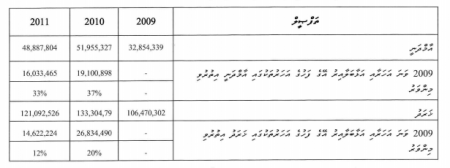The termination of an agreement to investigate the alleged misappropriation of state funds by the regime of former President Maumoon Abdul Gayoom cost the government MVR66.17 million (US$4.2 million), a special audit report of the defunct presidential commission has revealed.
The report released last month explained that UK-based firm Grant Thornton dissolved the ‘asset tracing, recovery and repatriation’ agreement on April 30, 2012, after the Attorney General’s (AG) Office failed to respond to eight emails seeking instructions on how to proceed following the controversial transfer of presidential power on February 7, 2012.
The report noted that a settlement agreement was reached following a mediation process in March 2013 for the government to pay the forensic accountancy firm MVR64.61 million (US$4.1 million).
The government also paid MVR1.56 million (US$101,167) for legal counsel – to Eversheds LLP – employed for the arbitration process.
Following full payment of the settlement claim, the report revealed that Grant Thornton handed over all documents and information related to its investigation as well as minutes of meetings and expert findings on November 13, 2013.
The AG’s Office shared the documents with the Anti-Corruption Commission (ACC).
“As the agreement was brought to an end before Grant Thornton’s investigation was fully concluded and because the presidential commission’s investigations had noted a number of cases of suspected corruption and embezzlement when its work came to a halt, this office believes that the investigations should be completed,” the audit report stated.
The Auditor General’s Office recommended the ACC conclude the investigations commenced by Grant Thornton.
Oil trade
Former President Mohamed Nasheed formed the presidential commission in May 2009 to investigate alleged corruption during his predecessor’s 30-year reign.
The audit report noted that the commission’s investigations were mainly conducted through Grant Thornton, which included the alleged illegal oil trade involving the State Trading Organisation’s (STO) Singapore branch, the 2007 audit report of the Bank of Maldives, and asset tracing of senior government officials.
Nasheed’s vice-president, former President Dr Mohamed Waheed Hassan Manik, dissolved the presidential commission shortly after assuming office on February 7, 2012.
A week before the transfer of power, the presidential commission forwarded for prosecution a case against then-opposition MP Abdulla Yameen for his involvement in the alleged oil trade during his time as chairman of the STO.
The allegations first appeared in February 2011 in India’s The Week magazine, which described Yameen as “the kingpin” of a scheme to buy subsidised oil through STO’s branch in Singapore and sell it through a joint venture called ‘Mocom Trading’ to the Burmese military junta, at a black market premium price.
The article drew heavily on an investigation report by Grant Thornton, which obtained three hard drives containing financial information detailing transactions from 2002 to 2008.
Investigators learned that Mocom Trading was set up in February 2004 as a joint venture between STO Singapore and a Malaysian company called ‘Mocom Corporation Sdn Bhd’, with a potentially lucrative deal of selling oil to Myanmar and an authorised capital of US$1 million, it acted as a front for an international money laundering racket.
The presidential commission sought criminal charges against Yameen and two other shareholders of STO Singapore – former Managing Director of STO Mohamed Manik and former Managing Director of STO Singapore Ahmed Muneez – and asked the AG’s Office to pursue civil compensation suits.
Yameen has dismissed the allegations on several occasions and disputed the illegality of the oil trade.
“It’s perfectly legitimate. I was a perfectly clean minister while in Gayoom’s cabinet. They have nothing on me,” he told Minivan News in February 2011.
Moreover, grilled by parliament’s national security committee in November 2011, he denied any involvement in “micro-management” of STO subsidiary companies. Upon assuming office in November, President Yameen called on the ACC to investigate the allegations.
Presidential commission audit
The audit report noted that the commission tasked Grant Thornton with investigating the finances of 12 associates and relatives of former President Gayoom.
If the amount of funds or assets recovered by Grant Thornton reached £1.5 million after deducting investigating costs, the government agreed to pay 25 percent as a fee and 35 percent if the figure exceeded £1.5 million.
In July 2010, the agreement with Grant Thornton was transferred from the audit office to the AG’s Office, the report noted.
Under revised terms of the agreement, the government agreed to pay Grant Thornton 2.5 times the cost of investigation if the agreement was terminated. Additionally, consultancy fees and rates were also raised.
Auditors calculated that the government had to pay MVR20.3 million (US$1.3 million) as a result of the modification.
Among other issues highlighted in the report, the audit office noted that the commission’s expenses were not monitored either by the President’s Office or other state institutions.
Moreover, emailed invoices and bills from Grant Thornton were paid without supporting documents, the report noted.
From May 2009 t0 February 2012, auditors found that the commission spent MVR36.02 million (US$2.3 million) for its investigations.

